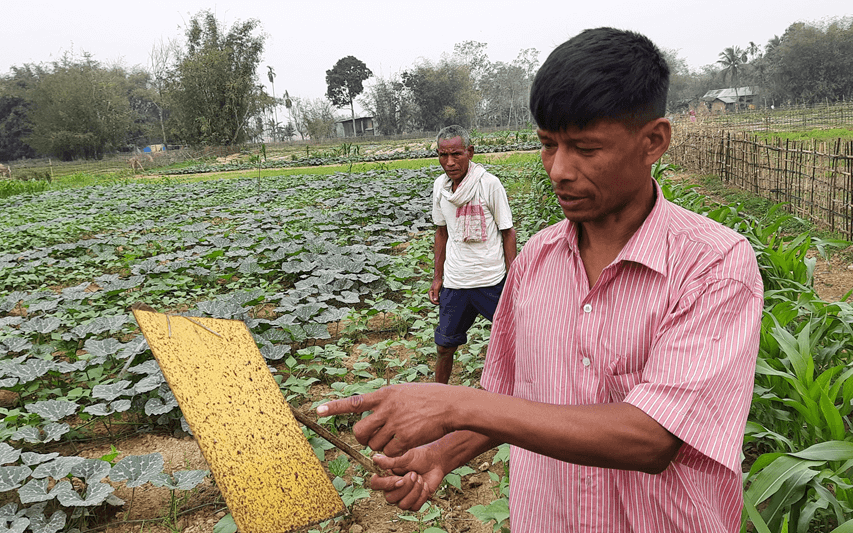Newsletter
Don't miss a thing!
We regularly provide you with the most important news, articles, topics, projects and ideas for One World – No Hunger.
Newsletter
Don't miss a thing!
We regularly provide you with the most important news, articles, topics, projects and ideas for One World – No Hunger.
Please also refer to our data protection declaration.
Peru

This project works towards an integrated digital advisory solution linking potato biodiversity monitoring with citizen science. Through a crowd-sourced application for the monitoring of potato landraces and an e-commerce platform we will create a self-sustaining value chain network. This way, we connect farmers, youth, teachers, technicians, policy makers, and consumers, provide access to high-value markets and sustain agrobiodiversity through timely conservation intelligence.
Why is it needed?
For the implementation of agroecological practices, one good start is locally adapted genetic and varietal diversity in the seed/vegetative planting material. The proposed project focuses on this agrobiodiversity in support of the agroecological transition, fulfilling a need that is gaining importance in view of climate change and the need for more diverse nutrition.
What is innovative about it?
The tools and approaches developed for this project have potential beyond potatoes. The proposed smartphone and crowdsourcing tools are novel for both the e-commerce and the conservation status monitoring, merging modern tools and citizen science for the benefit of farmers and consumers. Of interest also are the merging of different e-commerce, biodiversity conservation and use, mapping and educational objectives. The project’s initiators and consortium partners are a highly motivated and dedicated group, providing good assurances that despite the project’s ambitious objectives, a positive outcome can be expected.
"Visualization of results is always a plus, helping everyone to be on the same page. The digitized mapping of landraces makes it therefore attractive for all stakeholders to contribute and by doing so, care as a community for the irreplaceable local heritage."
Challenges ahead
It is expected that the tools and dashboards be developed during the proof-of-concept period. It may be a challenge to truly include women, the projects forecast is 50% women but simply involving women is not enough – to be effective, consider special support and training for women while also assuring for greater gender equality across all activities. Further challenges that may crop up concern the many components that have to come together to make the project work, which will require that the various stakeholders communicate well and have good collaboration.
The International Potato Center (CIP) is a research-for-development organization based in Lima, and is driven to deliver innovative science-based solutions to enhance access to affordable nutritious food, foster inclusive sustainable business and employment growth and drive climate resilience of root and tuber agri-food systems. CIP coordinates the landrace baseline and register development while supporting the urban e-commerce and leading the integrated platform development and policy linkages.

Grupo Yanapai, which means "Help" in Quechua, is a Peruvian non-profit association of interdisciplinary researchers who focus their activities on promoting research and development processes, fostering innovation and the exchange of experiences and knowledge to improve the management and handling of resources in order to achieve sustainable agroecological systems. Grupo Yanapai coordinates the training of farmers, youth and teachers and provides support to custodian farmers.

Asociación de Guardianes de Papa Nativa (AGUAPAN) is an association of "guardians" concerned to preserve the varietal diversity of the Andean potato in central Peru and ensuring the opportunity for its members to improve their welfare through biodiversity conservation. AGUAPAN organizes the supply of landrace mixtures for marketing (quality, quantity, traceability) and involves schools.

Resonanz Group is a company specialised in emerging technologies such as artificial intelligence or the Internet of Things (IoT) and in providing advisory services, ideation and venture execution. Resonanz Group develops the app, advices on e-commerce and traceability, as well as on integrated platform development.

We will adapt a hive management app (The Beekeeper’s Companion) for Lebanon with a focus on women beekeepers and combine it with a web app for extension workers to improve advisory services and monitoring of bee health.

This project explores an innovative advisory model for agroecological vegetable farming based on farmer producer companies in India.

This project builds ground for the agroecological transformation of smallholder farming in Senegal following a holistic bottom-up approach.

This project is aiming to digitally empower rural youth as providers of agroecological advisory in small-scale potato farming in India.